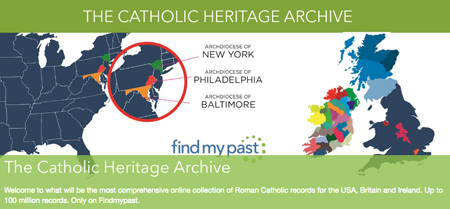
UK-based Findmypast.com has brought arsenals of records from all over the British Isles to the Internet—ranging from censuses to newspapers to vital records. But for the family historian with German-American ancestors, the site’s most notable accomplishment is its growing collection of digitized Roman Catholic sacramental registers from Catholic archdioceses in the United States, including so-called “national” parishes that were geared toward immigrants speaking foreign languages.
Backing up for a moment: Unlike churches in most Protestant denominations, which generally open their historical records without restriction, Roman Catholic dioceses and archdioceses have varied rules regarding records access. Some have allowed their records to be microfilmed (and a few have even published their own transcripts of older records), but many others have allowed searches of their records only by their own staff or volunteers. And even when individuals can access Catholic church records, they often have to know the ancestor’s specific parish (which, of course, is often one of the facts being sought, leading to a tiger-chasing-its-own-tail situation).
Enter Findmypast. The subscription service has long boasted its millions of Irish and Scottish Catholic records. It made waves at the RootsTech 2017 conference when it announced “a close collaboration with the Catholic Church to bring […] millions of centuries-old records and images to your fingertips for the first time ever,” creating a Catholic Heritage Archive that included records from English archdioceses (Birmingham and Westminster, with records dating to 1657) as well as the Archdiocese of Philadelphia, with plans for Baltimore and New York in the works.
The new Catholic Heritage Archive project will bring researchers to Catholic records that were once difficult (if not impossible) to find. The Philadelphia archdiocese was one of the previously “close to the vest” units that did not allow researchers free access to records, so the fact that its records are the first of Findmypast’s US Catholic records to go online is great boost for researchers’ access—and a sign that more elusive Catholic records will soon be digitized.
This project is especially useful to researchers with German heritage, as many German immigrants had a strong Catholic identity. By the end of the nineteenth century, for example, Philadelphia had at least five German “national” parishes that overlaid the normal geographic boundaries of Catholic parishes. Findmypast currently has records from two of these parishes (St. Aloysius and St. Ludwig) online in the Catholic Heritage Archive, and researchers can expect more relevant records to be published as records from more cities are added to the archive.
The baptisms, marriages and burials all are rich in genealogical information, and they’re key to determining where your ancestors came from in Germany. The records usually give the principals’ birthplaces, although foreign locations usually refer to German states such as Bavaria or Baden rather than actual villages within those states.


